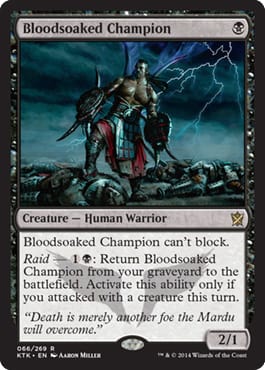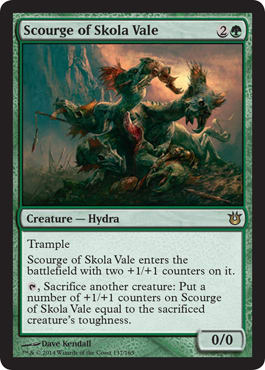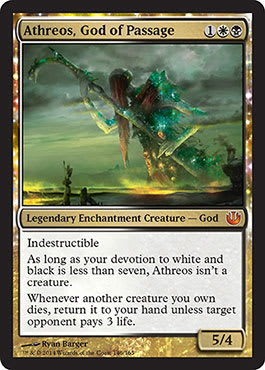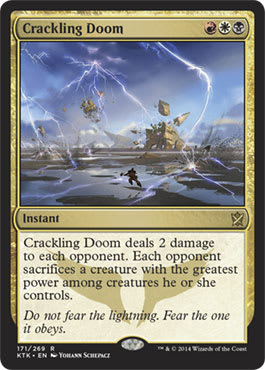Building a budget deck is all about finding the things that other players have overlooked. Since the most powerful cards are often the most expensive as well, it’s often helpful to look for a connected strategy that makes a deck greater than the sum of its parts. The strategy I’ll be looking at today is death.
In any format, particularly in Standard, there are cards that are not quite good enough—cards that seem powerful or useful in some way but that just don’t quite make the cut when put up against the pillars of the format. This week, it occurred to me that, right now, a number of those cards have to do with creatures dying. Athreos, God of Passage, Grim Haruspex, and Abzan Ascendancy—all of these have powerful abilities and low mana costs, but they don’t quite fit into existing decks in those colors. So let’s make a new one, shall we?
Sacrificial Abzan ? Khans of Tarkir Standard | Mike Cannon
- Creatures (28)
- 1 Phytotitan
- 4 Black Cat
- 4 Bloodsoaked Champion
- 4 Butcher of the Horde
- 4 Grim Haruspex
- 4 Hooded Hydra
- 4 Scourge of Skola Vale
- 3 Athreos, God of Passage
- Spells (7)
- 3 Dictate of Erebos
- 4 Abzan Ascendancy
- Lands (25)
- 1 Forest
- 1 Plains
- 1 Wind-Scarred Crag
- 2 Blossoming Sands
- 3 Bloodfell Caves
- 3 Rugged Highlands
- 4 Jungle Hollow
- 4 Nomad Outpost
- 4 Sandsteppe Citadel
- 2 Urborg, Tomb of Yawgmoth
The Sacrifices
Bloodsoaked Champion is perfect for this deck. It can be sacrificed repeatedly for just 2 mana each time, provided you keep attacking with something. With Athreos threatening to charge your opponent 3 life, you can cut that cost in half by returning it to your hand instead. After all, paying 3 life is hardly worth it when the creature is coming back either way. Each time you sacrifice the Champion, you’ll trigger any number of awesome abilities, from drawing extra cards to wiping out your opponent’s board.
Black Cat is another piece of sacrifice fodder than can come down early. Although it doesn't come back from the graveyard, it does give you some value when it goes there. With a bit of luck, it can make the game much more difficult for your opponent.
Hooded Hydra is another creature that gives great value when it dies. Sacrifice it once, and it’ll give you even more creatures to work with. It’s also a powerful late-game card that can show up any creature your opponent might cast.
Phytotitan is another creature that doesn’t like to stay dead. Unfortunately, it doesn’t return to the battlefield until your upkeep, meaning it can only attack every other turn provided your opponent has anything to block with. However, it can still be sacrificed every turn. That means Butcher of the Horde always has lifelink, and Scourge of Skola Vale can gain a pair of +1/+1 counters every turn. If you combine it with Dictate of Erebos, it can make it almost impossible for your opponent to keep anything on the battlefield.
The Sacrificers
Unfortunately, there aren’t a ton of great sacrifice abilities in Standard at the moment. Most of them require a prohibitive amount of mana each time you want to sacrifice something, and they aren’t powerful enough to justify that cost. Scourge of Skola Vale was the one solid choice I could find, although the fact that it must tap to activate its ability is less than ideal—as is the fact that it counts toughness rather than power. However, it’s still a good way to keep triggering your other cards, even if the Scourge’s ability wouldn’t be worth it on its own.
Due to the lack of strong options available, I decided it was worth splashing red to include the one truly powerful sacrifice outlet in Standard at the moment. Butcher of the Horde is already a big creature for its cost, and giving it a slew of abilities such as haste and lifelink just makes it even harder for your opponent to survive. If it doesn’t end the game on its own, the triggers you gain from sacrificing creatures will.
The Triggers
Most of the time, Athreos just makes your opponent lose 3 life every time one of your nontoken creatures dies. Most of the time, it’s worth it to keep the creature off the battlefield, at least until your opponent starts running out of life. Then, your Spirit tokens should be able to finish the job pretty easily. Of course, there are some creatures that your opponent won’t ever pay 3 life for. Bloodsoaked Champion is one since it comes back either way. Phytotitan is the other, and unfortunately, it becomes almost unusable with Athreos on the battlefield. Athreos doesn’t give you the option of not returning the creature to your hand, so it’ll cost another 6 mana if you want Phytotitan back. That’s not exactly ideal, but if you have Athreos on the battlefield, you probably don’t need Phytotitan anyway.
Abzan Ascendancy gives you a free creature whenever one of your dies. That’s pretty good already, but as a flying Spirit, that free creature is also an evasive threat. That 1 damage may not seem like much, but with how many times this deck can trigger the Ascendancy, those Spirits can add up quickly.
Dictate of Erebos is the removal of the deck. Rather than take out creatures one at a time, this deck seeks to wipe out the opponent’s battlefield entirely through endless sacrifice triggers. With plenty of creature tokens to block with, it shouldn’t be hard to buy enough time for the Dictate to go to work.
Grim Haruspex keeps the deck going late into the game, making sure you never run out of cards. This deck is built around value and card advantage, and Grim Haruspex does that better than anything else.
Playtesting
Mardu Midrange — Game 1
I lost the roll, and my opponent and I both played lands for a few turns.
I cast a Black Cat on turn three to get things started, and my opponent cast Butcher of the Horde. I cast Grim Haruspex and passed the turn.
My opponent cast Sarkhan, the Dragonspeaker. He turned him into a Dragon and attacked with both creatures for 9. I cast a face-down creature and attacked Sarkhan with Black Cat and Grim Haruspex.
My opponent cast Seeker of the Way and attacked with Sarkhan and the Butcher again. He passed the turn, and I turned my face-down Grim Haruspex face up during his end step. I attacked Sarkhan with everything. My opponent killed one Haruspex with Lightning Strike and traded Seeker of the Way for the other, leaving Sarkhan with 1 counter. I cast Hooded Hydra, and my opponent killed me with flying creatures.
Game 2
Each side started with a Nomad Outpost, and I cast Bloodsoaked Champion on turn two. He played Temple of Triumph, and I attacked with the Champion. My opponent cast Goblin Rabblemaster, making a token and hitting me for 1.
I attacked for 2 with Bloodsoaked Champion and cast Butcher of the Horde. My opponent made another Goblin and attacked me for 2. I took the damage, and he cast Seeker of the Way and passed the turn.
I cast Abzan Ascendancy, putting counters on both creatures. I passed the turn. My opponent made another Goblin token and attacked with all three. I sacrificed Bloodsoaked Champion to give Butcher of the Horde lifelink. I blocked a Goblin with the Butcher and went to 22. My opponent cast Hordeling Outburst and ended his turn.
I cast Bloodsoaked Champion and sacrificed it to give Butcher of the Horde lifelink and make a Spirit token. I attacked for 6, putting my opponent at 9. I returned both Champions to the battlefield from my graveyard and ended my turn. My opponent made another Goblin token and attacked with everything. I blocked Goblin Rabblemaster with both Spirit tokens, and my opponent killed one with Magma Jet. I dropped to 20 life, and my opponent went up to 12 and ended his turn.
I attacked with my Bloodsoaked Champions. My opponent took the damage. I sacrificed both to Butcher of the Horde, and I brought both back to the battlefield. I cast Scourge of Skola Vale and passed the turn. My opponent attacked with six Goblin tokens and Seeker of the Way. The Butcher blocked the Seeker, and Scourge of Skola Vale blocked a token. I sacrificed my Champions to give the Butcher lifelink and first strike, making two Spirit tokens. My opponent cast Lightning Strike and Magma Jet to kill Butcher of the Horde. I took 5 damage, and he passed the turn.
I cast Bloodsoaked Champion and passed back. My opponent attacked with six Goblin tokens again. I cast Dictate of Erebos and blocked five Goblins with four Spirit tokens and Scourge of Skola Vale. I took 1 damage and lost all my Spirits, but my opponent’s entire board was wiped out. He passed the turn, and I sacrificed Bloodsoaked Champion to the Scourge, making a Spirit.
I attacked for 4 with my two creatures, and I spent 6 mana to return all three copies of Bloodsoaked Champion from my graveyard. I passed the turn, and my opponent drew his card and conceded.
Game 3
My opponent started things off on turn two with Seeker of the Way. I had no turn-two play, and he attacked for 2 with the Seeker.
I cast Bloodsoaked Champion and Black Cat before passing the turn. He killed the Cat with Magma Jet during my end step, discarding Goblin Rabblemaster.
He attacked for 2 with the Seeker again, and he cast Butcher of the Horde. I cast Grim Haruspex and passed the turn.
Butcher of the Horde hit me for 5, and my opponent cast a second copy before ending his turn. Still without white mana, I cast Scourge of Skola Vale and ended my turn.
My opponent dropped me to 2 with the Butchers, and he cast Crackling Doom to end the game.
Wrap-Up
This deck definitely has some late-game power, but it takes time to get going. The four-color budget mana base doesn’t help, with almost every land entering the battlefield tapped. It seemed that Butcher of the Horde, Bloodsoaked Champion, and Abzan Ascendancy were doing all the work while the other cards lagged behind. In the end, I’m not sure this deck has the support it needs right now, but I’ll certainly be keeping an eye on the rest of Khans of Tarkir block for sacrifice outlets and good creatures to fuel them. With three powerful cards to build around, the deck doesn’t need too much more to turn into something that can put up a good fight at Friday Night Magic.




























